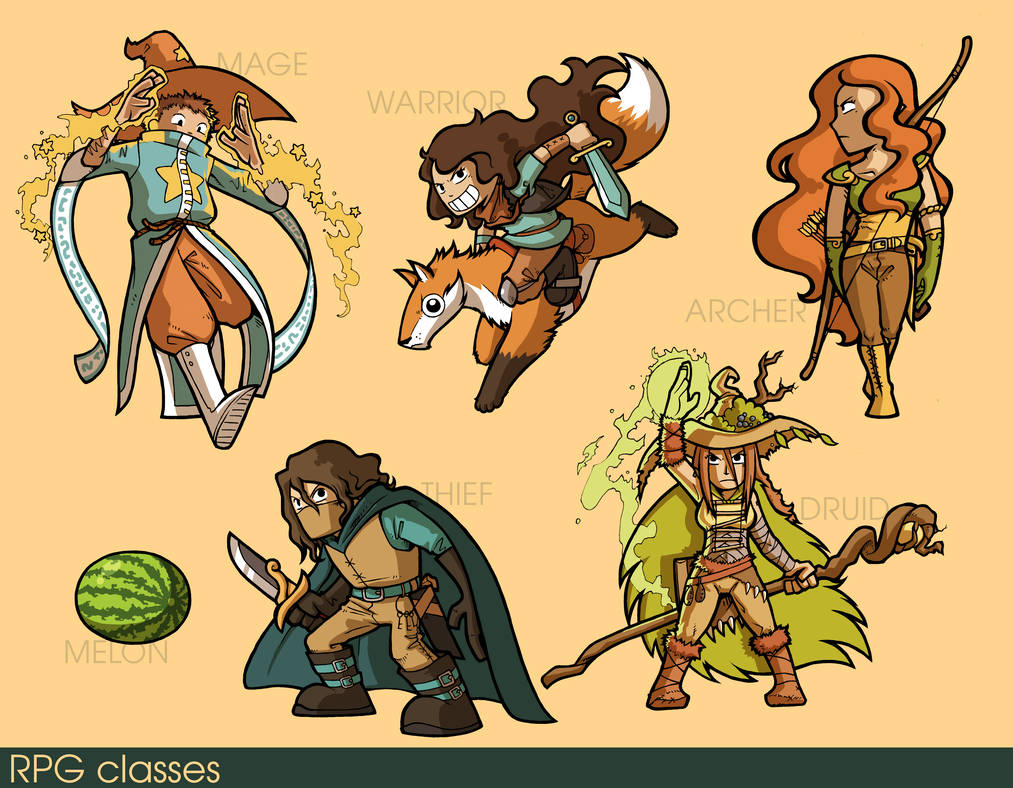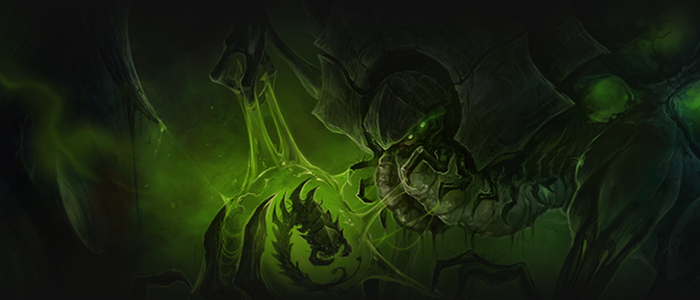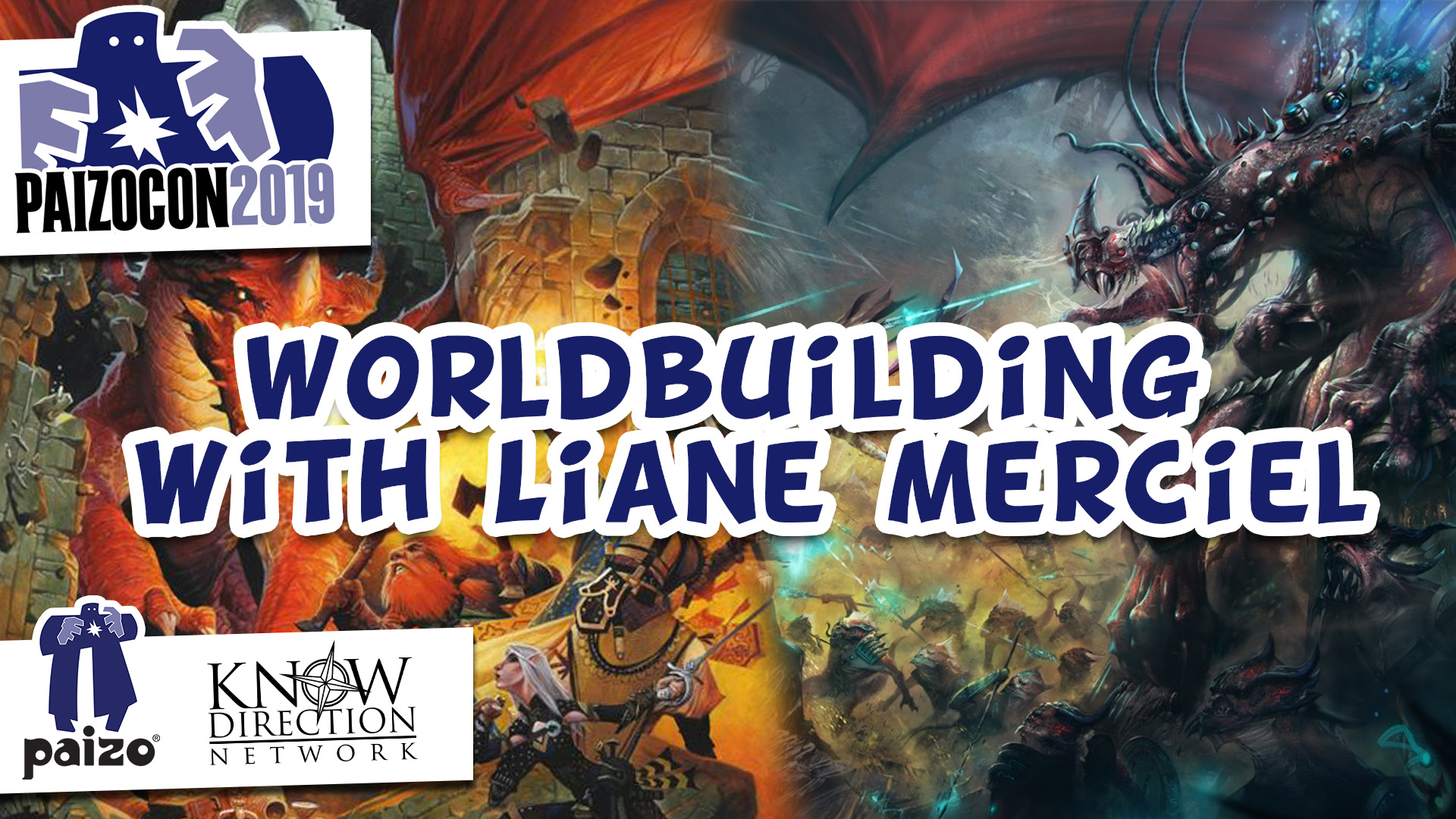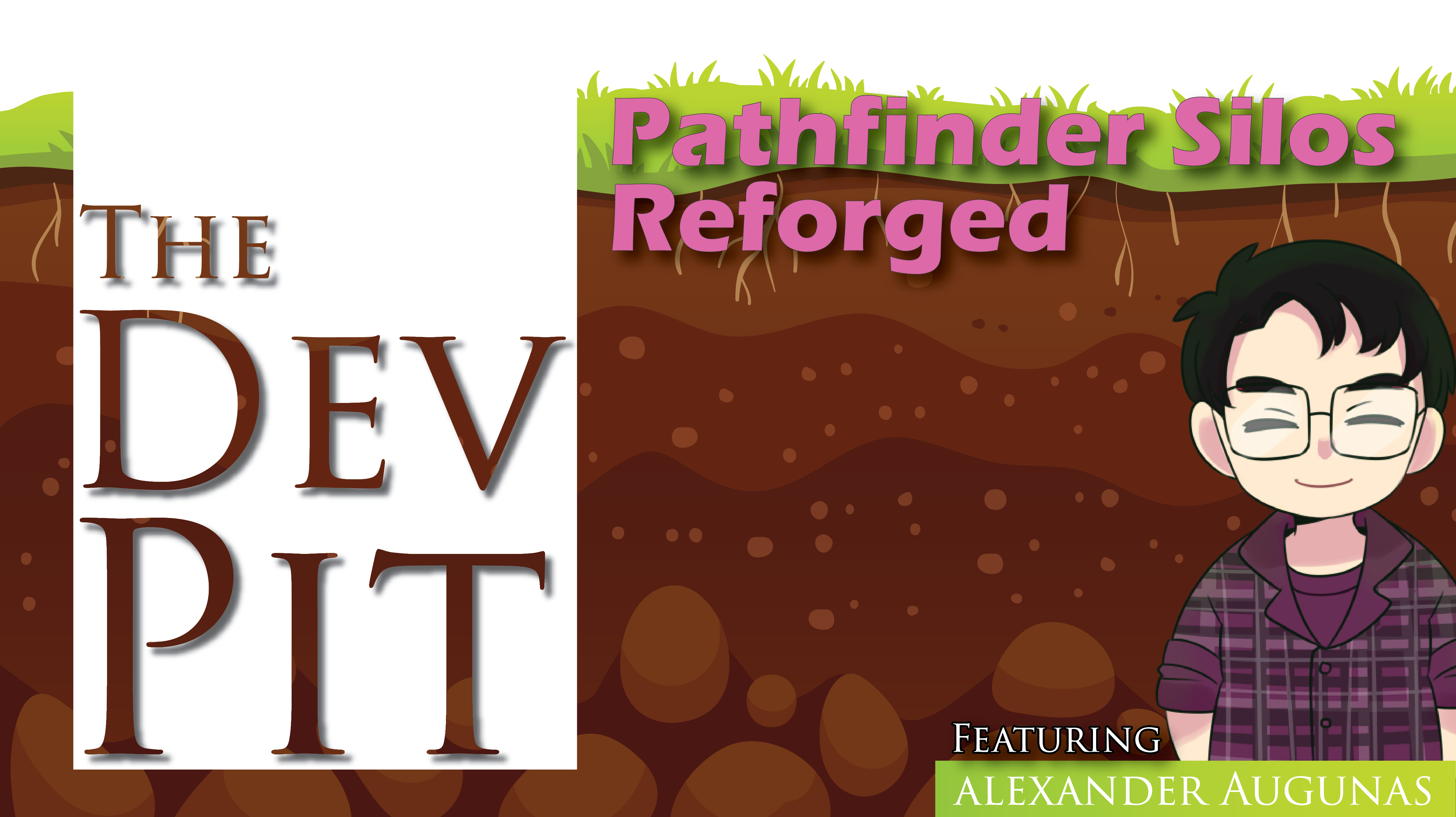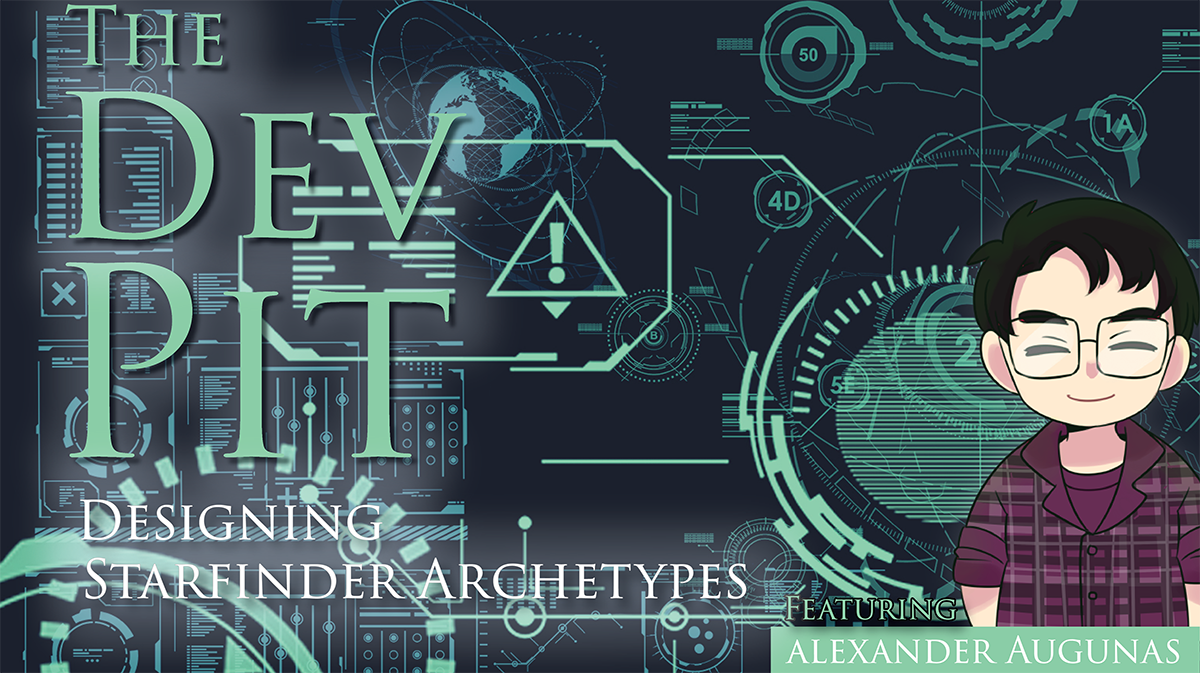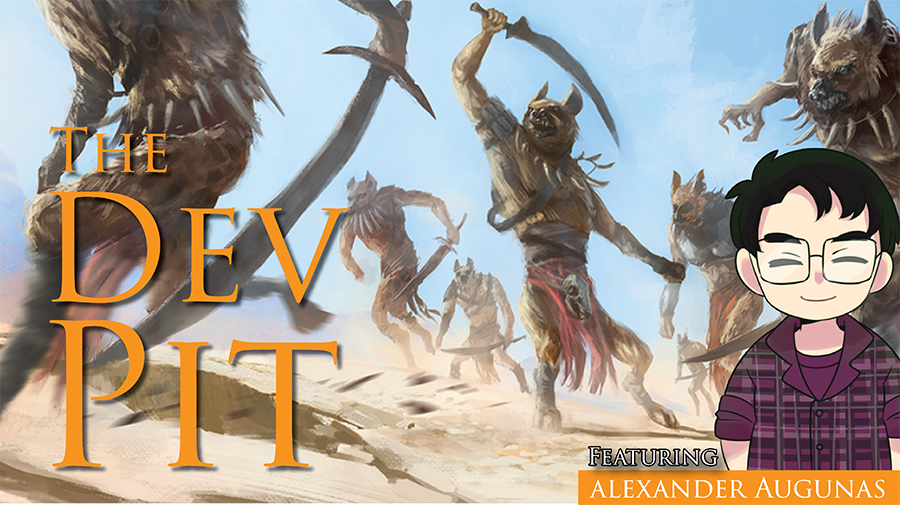Hey everyone!
I know I said last Monday that I was going to do an article on character roles, and I still aim to do that. However, ever since the Network’s own Vanessa Hoskins made this really neat thread on the Pathfinder Facebook group that asked the question, “How should PF2 do PF1 class concepts?” I can’t get the question out of my brain, so I’m doing to do a quick Dev Pit article here! Today, we’re going to focus on classes from the Advanced Class Guide and Advanced Player’s Guide. Don’t worry, I’ll get to the others sometime in the future!
Fair warning — these concepts are based on what I’ve seen of Pathfinder 2E at PaizoCon 2019 and what I’ve seen of the Pathfinder Playtest. Not all of this information may remain relevant once the Core Rulebook is released in August, but this should make for a fun article regardless. Ready? Let’s go!
Antipaladin
First one’s easy! Antipaladin (and Tyrant) definitely should become new orders for the champion. Many of the super evil antipaladin class features would likely need to become champion feats too, which is fine. After all, an evil champion’s lay on hands probably shouldn’t be healing nobody. (Or maybe it will; an evil warpriest’s fervor still healed them!)
Arcanist
So, this might be a bit controversial but I think that arcanist shouldn’t be a class anymore. It should be an archetype for any spellcaster that uses the arcane spell list. Basically, the dedication feat would give you the arcane reservoir and every other arcanist archetype feat would give you options for spending your arcane points on doing cool stuff and possibly consume magic. The quick study feat should probably just be a wizard spell under this paradigm.
Bloodrager
I’ve been thinking a LOT about whether you could do bloodrager justice as a barbarian archetype or a sorcerer archetype, and more and more I am convinced that the answer is “No”. What made bloodrager special was the uniqueness of its bloodlines; specifically, the ability to freely apply awesome spells to yourself using bloodline powers from sources like the arcane bloodline or the greater bloodrage class feature. While you could certainly have a barbarian with the sorcerer archetype who casts spells or a sorcerer with the barbarian archetype who rages, neither really hits on what makes the bloodrager FUN in my opinion. So I strongly support bloodrager being its own class in PF2; archetypes won’t hit the gameplay that the class had in PF1 because you really do need those custom melee-focused bloodlines.
Instead of spellcasting, the bloodrager could do with a list of unique focus spells that they can cast on themselves while raging. Whether these duplicate the effects of existing spells or are custom spells on their own, I don’t know. But the low-spells high-magic concept of the bloodrager is amazing, and I would hate to see it lost.
Brawler
Brawler really has one or two tricks going for it—martial flexibility and awesome blow. Everything else is strongly coded under PF1’s Two-Weapon Fighting style or is a direct result of needing to give classes boosts to combat maneuvers to make them worth using. I think the brawler isn’t even worth an archetype; give the fighter and monk feat chains that allow them to temporarily gain lower-level class feats that they don’t have (perhaps the monk needs to spend focus points, but the fighter can just do it). For example, maybe Martial Flexibility is a 4th-level fighter feat that allows the fighter to gain a 2nd-level fighter feat he doesn’t have using two actions. At 8th-level, Improved Martial Flexibility might allow the fighter to gain a 6th-level fighter feat he doesn’t have using two actions or a 4th-level or lower fighter feat as one action. That sort of thing.
Cavalier
Paizo made the cavalier an archetype for anyone in the Pathfinder Playtest, and it was glorious. Cavalier wizards? More of that, please!
Hunter
At first I was going to argue for the hunter as *the* spellcasting ranger option, but then I came to a realization—hunter can be something that neither druid nor ranger is in PF2. In PF2, what we’ve seen of druids and rangers suggests that animal companions aren’t core components of those classes; they’re gained from class feats that you might or might not take. As a result, the hunter has the opportunity to truly become *the* animal companion class. They get one at 1st level, no feats required, and most of their feats and class features enhance those neat teamwork attacks that were built into the animal companion rules in the Pathfinder Playtest. Druids and rangers might even want to multiclass with the hunter class so they can add some neat tricks to their animal companion too!
Investigator
The investigator in PF1 is a very strange class. It’s parents are the alchemist and the rogue, and yet somehow the investigator developed into this very distinct class that sort of transcended both of them. In PF1, the investigator is the BEST at skills, and it truly does a good job of feeling like the “smart” fighter. In PF2, the rogue is awesome at skills and is very clearly the agility fighter. As a result, I think that there’s room for the investigator to simply be an awesome skill-focused class. Drop the alchemy and the spellcasting, focus on expertise and studied combatant, and have feat options give you new ways to use your inspiration and skills. Want to be a standard investigator? Grab the alchemist multiclass archetype. I think an emphasis on what makes the investigator unique could see it developed into the perfect detective / skill-emphasizing class for PF2.
Oracle
Oracle … is not in a great place conceptually coming into PF2. The oracle and its mystery mechanic was always presented as sort of the “sorcerer 2.0”, and now that sorcerer feats work kind of like revelations and sorcerers can kind of be oracles by picking bloodline that grant divine spellcasting, what is there even left of the oracle to salvage? The curse mechanic? That’s cool, but is that really the part of the oracle that made the oracle fun to play? I would argue that it isn’t. I don’t want to see the oracle fade away, but at the same time we need to accept that an oracle class in PF2 can’t be built the way it was in PF1; that entire design ground seems to have been consumed by the sorcerer.
Instead, I would recommend having mysteries work similarly to bloodlines but focused on natural phenomenon (the way they are in PF1) and to give the oracle a hybrid spell list that combines the divine spell list with specific, appropriate spells from either the occult or primal spell list depending upon the mystery. For example, maybe the flames mystery gave spells like fireball and produce flames as primal spells while the dark tapestry mystery might give some occult spells instead. This would transform the oracle from being a simile divine spellcaster to a hybrid spellcaster. If we further give oracle feats an emphasis on divination, harkening back to its Greecian roots, and make those divinations tied to their mystery, we could have a very unique class that wouldn’t be competing for design space against the sorcerer.
Shaman
Similar to how the druid is a primal spellcaster, not a divine spellcaster, I think the best move for the shaman is to become the prepared spellcaster of the primal magic type. Shaman as a class concept is super cool, and its such an iconic fantasy element that transforming it into an archetype doesn’t really do the shaman justice for the same reason that giving the druid a bunch of shaman themed archetypes also wasn’t a shaman. I think the spirit mechanic that the shaman had was neat and cool, but if we moved away from spirit and called them something else (maybe anima?), it would give us room to make sure the shaman didn’t bump into the future medium class’s design space.
Skald
This isn’t even an archetype. The skald should be simplified to a bunch of composition cantrips for the bard. Aside from those raging songs and the ridiculously powerful ability to give rage powers to allies, the skald wasn’t even a class in its own right. With the way the classes work in PF2, I don’t foresee the designers just letting bards give whatever barbarian feats they want to their allies willy-nilly. I can see a feat chain for bards where the bard gets to pick one feat or one instinct from a limited list and share those around, but even then what else does the skald get? How does the skald manage to be different from the bard outside of a few core features? It doesn’t. Reunite the bard and the skald! (Sorry Hakon, but we’ve gotta let you go.)
Slayer
With how the ranger’s hunt target action appears to work, the slayer is also out of a job. Compared to other Advanced Class Guide hybrid classes, the slayer had the fewest new mechanics of all of them; study opponent was always just “I choose my own favored enemy”, sneak attack was sneak attack, the majority of slayer talents were simply repurposed rogue talents, and so on. If slayer’s advance was repurpsoed into “sudden charge a la fighters, but your movement must end within 30 feet of your hunted prey”, the slayer would be completely reconsumed by the ranger and honestly, no one would probably care. You only really played a slayer to be a flexible, nonmagical ranger anyway, but the ranger is flexible and nonmagical as a baseline now. The ONLY argument I can see for the slayer is if you want a more urban skill set.
Summoner
So, obviously summoner should exist as a class because no other class has an eidolon mechanic. Or, could they? I think it would be pretty awesome if a champion paladin could have an archon or an angel buddy, or if a wizard could have a demon companion. That seems REALLY cool to me, so why don’t we make the eidolon in a more general mechanic like what we see with animal companions and familiars? If we do, then we could give wizards and sorcerers and clerics options that interact with them. (For example, how cool would it be for witches to have a feat that transforms their familiar into a demon that uses eidolon statistics?!) So if we do this, where does that leave the summoner? Honestly, in a similar boat to the hunter. All of their feats and class features being balanced around making their eidolon better then what those other classes could get. Along the same lines, summoners could get summon creature spells as a focus spell with some sort of a limit, and giving them options to either fuse with their eidolon or do other crazy things with it could be cool. I think this is the best path forward for the summoner; sharing the eidolon a little so it could be the definitive master of it.
Swashbuckler
So, I’m gonna say it—in a world where the PF2 rogue exists, why do we need a swashbuckler? The PF2 rogue hits all the high notes of the swashbuckler—awesome with finesse and agile weapons, great at acrobatic skills, great attack bonus with its favored weapons. Where does this leave the swashbuckler? Well, the first thing I would do is take the grit / panache mechanic and make it into an extraordinary variant on focus spells. Instead of spell points, you gain grit points and your deeds are basically abilities you spend grit points to activate. Like focus spells, your grit comes back when you rest. You could give grit and deeds to all nonmagical martial classes—barbarians, fighters, rangers. It would definitely fill a niche for those classes.
Now, as for the swashbuckler itself, I’d combine the gunslinger and the swashbuckler into a single class: the daredevil (or something equivalent). The daredevil would be THE best at grit points and deeds; they’d have ways for regaining grit points on the fly when they critically succeed at certain attack rolls and skill checks and have an impressive list of deeds for use in and out of combat. The class would also have a built in weapon style system sort of like how the champion has paladin / redeemer / liberator, except the daredevil’s would be based around the character’s mystique rather than their alignment. Things like braggart, craven, lionheart, lone wolf, and so on. This would take the emphasis of what is current the swashbuckler away from a small list of weapons and move it towards the character motivations, which has always been the focal point of the archetypal swashbuckler.
Warpriest
After that lovely, long description of the swashbuckler, it’s almost humorous how quick this one’s going to be. Even though the warpriest was originally conceived as a fighter / cleric hybrid, its niche is basically the domain of the champion now. I think that if sacred weapon and sacred armor became a champion and a cleric feat option, no one would really miss the warpriest. Especially if ferver became an option for the cleric to spend focus points to quickly apply spell effects to herself. Maybe, “Spend a Focus Point. Now you can cast a harmless spell with 1 fewer action, but you can only target yourself.” Boom. Wapriest DONE.
Witch
Witch is SUPER easy to design in PF2. A witch gets a familiar at 1st level without needing to spend a feat, and their hexes are a special type of cantrip called hex cantrips. Gone are the days of having to pick a healing hex a dozen times; its all built in and scaling with hex cantrips! Also, I think witches should be the prepared spellcasters of the occult spell list; I know we’ve gotten used to them as arcane, but if ever there was an occult spellcaster, it was the witch! Maybe part of the patron could be pulling a small themed assortment of spells from the divine, arcane, or primal lists and adding them to the witch’s occult list or something.
And there you have it! If I was in charge of handling the porting of the Advanced Classes to PF2, this is exactly how I would do it. Will I do this for Everybody Games? Probably not. I’m not crazy about making content that’s destined to be invalidated by the First-Party publisher personally, and would much rather update some of my own content and try new stuff. But this was a lot of fun to brainstorm, so I’m going to do it again in two weeks! Next week I’m going to continue my kineticists of Tian Xia series with either a samsaran built or a wayang build, and the week after that I’m going to do Part 2 in this series: the Ultimate Classes! After that I’ll finish up my kineticists of Tian Xia series, finish this series with Part 3: The Occult Classes, and then FINALLY get around to that Dev Pit article on character roles and how your design is affected by them. (Unless that puts me in August, in which case I might break for some PF2 Analysis articles.) So we’ll see! THE FUTURE IS UNCERTAIN!
Thanks for reading, and I’ll see you next time in the Dev Pit!

Alexander “Alex” Augunas has been playing roleplaying games since 2007, which isn’t nearly as long as 90% of his colleagues. Alexander is an active freelancer for the Pathfinder Roleplaying Game and is best known as the author of the Pact Magic Unbound series by Radiance House. Alex is the owner of Everyman Gaming, LLC and is often stylized as the Everyman Gamer in honor of Guidance’s original home. Alex also cohosts the Private Sanctuary Podcast, along with fellow blogger Anthony Li, and you can follow their exploits on Facebook in the 3.5 Private Sanctuary Group, or on Alex’s Twitter, @AlJAug.
Creative Commons Credit: Card Game Classes by doxinsoxx

